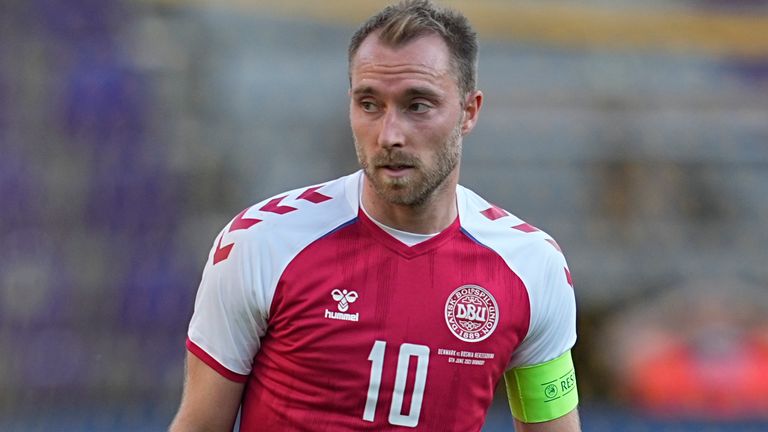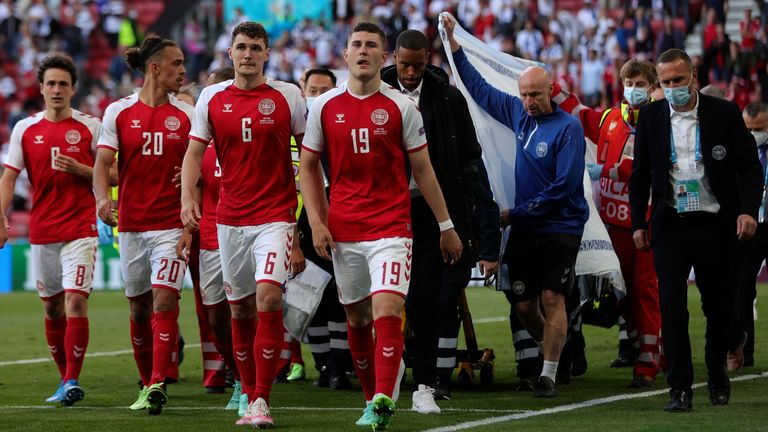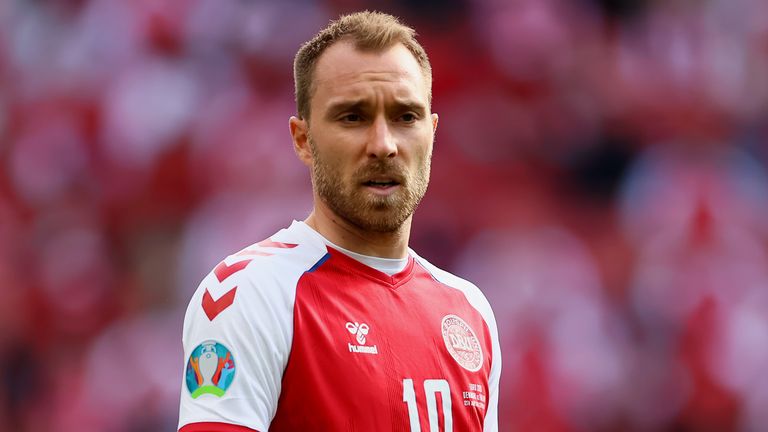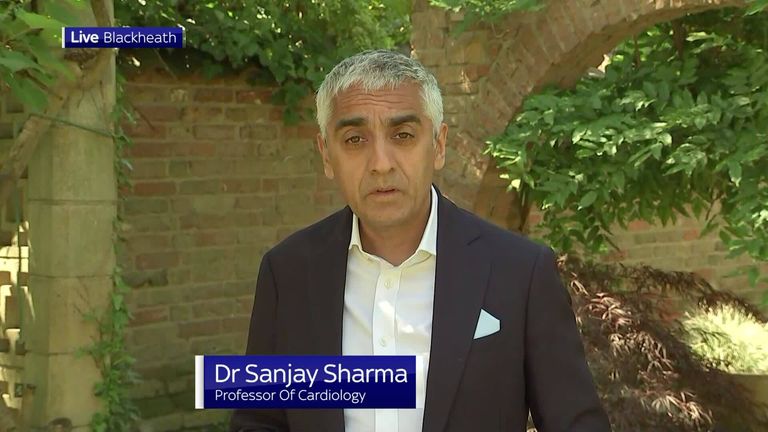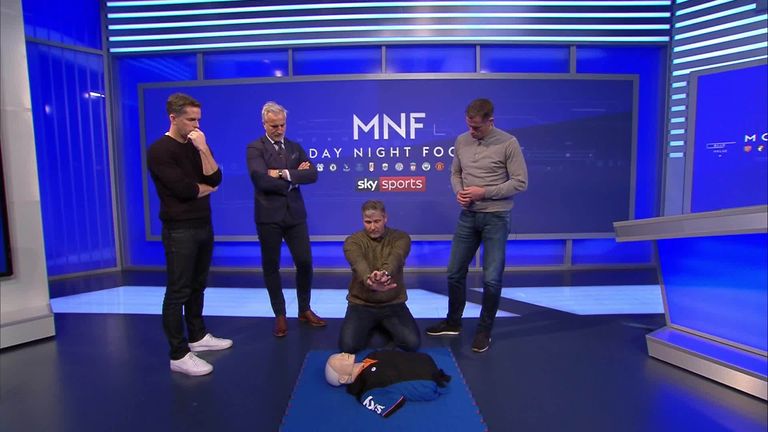Christian Eriksen: Denmark midfielder to be fitted with heart-starting device following cardiac arrest
Christian Eriksen was given CPR on the pitch during Denmark's game against Finland on Saturday, which was halted as the 29-year-old was taken to hospital; Denmark team doctor Morten Boesen confirms Eriksen will be fitted with a heart-starting device
Thursday 17 June 2021 17:30, UK
Christian Eriksen will be fitted with a heart-starting device (ICD) after suffering a cardiac arrest during Euro 2020, Denmark team doctor Morten Boesen has confirmed.
The 29-year-old was given CPR on the pitch at the Parken Stadium in Copenhagen after collapsing during the first half of his side's 1-0 Group B defeat by Finland on Saturday evening.
Speaking after the match, Boesen said Eriksen was "gone", but swift treatment on the field of play and by hospital staff meant the Inter Milan midfielder was stabilised, and he was later able to send his greetings to team-mates.
- Eriksen thankful for support: 'I'm fine under the circumstances'
- Denmark doctor: Eriksen was 'gone' but tests normal
- Delaney: Denmark stronger together after Eriksen collapse
- Denmark boss criticises UEFA after Eriksen collapse
Providing an update on Thursday morning, Boesen said: "After Christian has been through different heart examinations it has been decided that he should have an ICD (heart starter). This device is necessary after a cardiac attack due to rhythm disturbances.
"Christian has accepted the solution and the plan has moreover been confirmed by specialists nationally and internationally who all recommend the same treatment.
"We encourage everybody to give Christian and his family peace and privacy the following time."
Eriksen's former Ajax team-mate Daley Blind, who is representing the Netherlands at Euro 2020, had an ICD fitted after being diagnosed with a heart condition in 2019.
Blind spent three years with Eriksen at Ajax from 2010 to 2013 and revealed he considered missing his country's opening game of the tournament after Saturday's incident.
He broke down in tears after being substituted midway through the second half of the Netherlands' 3-2 win over Ukraine on Sunday.
What is an ICD?
According to the British Heart Foundation, an Implantable Cardioverter Defibrillator (ICD) is a small device that can treat people with dangerously abnormal heart rhythms.
It sends electrical pulses to regulate these rhythms, especially those that could be dangerous and cause a cardiac arrest.
If an ICD notices a dangerous heart rhythm it can deliver one or more of the following treatments:
- Pacing - a series of low-voltage electrical impulses (paced beats) at a fast rate to try and correct the heart rhythm.
- Cardioversion - one or more small electric shocks to try and restore the heart to a normal rhythm.
- Defibrillation - one or more larger electric shocks to try and restore the heart to a normal rhythm.
Eriksen thankful for support: 'I'm fine under the circumstances'
On Tuesday, Eriksen addressed the public for the first time since his collapse by expressing his thanks for the goodwill messages he has received.
Posting on Instagram, he said: "Hello everyone. Big thanks for your sweet and amazing greetings and messages from all around the world. It means a lot to me and my family.
"I'm fine - under the circumstances. I still have to go through some examinations at the hospital, but I feel okay.
"Now, I will cheer on the boys on the Denmark team in the next matches. Play for all of Denmark. Best, Christian."
Kjaer: We will play for Eriksen
Eriksen's sudden collapse on Saturday prompted Denmark captain Simon Kjaer to clear his team-mate's airways and start the life-saving CPR technique, which was continued with the aid of a defibrillator and professional medical staff.
Following the news on Thursday that Eriksen will be fitted with an ICD, Kjaer said: "It has been some very special days, where football has not been the most important thing.
"A shock, that will be part of me - part of all of us - forever. The only thing that is important and really matters, is that Christian is okay.
"I am proud of how we acted as a team and how we stood together in these difficult times. I am touched and very grateful for all the support.
"[On Thursday], we will enter the pitch against Belgium with Christian in our hearts and thoughts. It gives us peace in our minds, which allows us to focus on the game of football.
"We will play for Christian, and as always for all of Denmark. That is the greatest motivation for us all. As always: we will do our best."
How did CPR save Eriksen's life?
CPR is quite easy to learn and it can be the difference between life and death before emergency medical services can arrive to help out.
So what is it, how does it make a difference and how should you behave if you find yourself in an emergency?
What is CPR?
CPR stands for cardiopulmonary resuscitation and is a medical technique which is given to someone who goes into cardiac arrest.
That occurs when the heart encounters an electrical issue and stops pumping blood around the body and to the brain, causing the person to fall out of consciousness and stop breathing.
Medics define this as 'clinical death', which is the onset of biological death, although CPR can help re-start the person's heart functions and save their life.
By administering chest compressions and rescue breaths, the CPR performer helps to pump blood and oxygen around the person's body, taking over the role of their heart and lungs.
Why is CPR so important?
"Time is myocardium, that's what we say in medicine - that means the longer that there is a time delay, the higher the chance that the heart muscle will never recover," Professor of Cardiology Dr Sanjay Sharma told Sky Sports News.
"In fact for every minute that passes, the chances of an individual surviving go down by between seven and 10 per cent. So it's very, very crucial to keep the heart beating during these crucial moments and get the heart started as quickly as possible.
"Not just so that the cardiac outcome will be good, but also that the other organs, such as the brain, remain well perfused so that the individual after survival remains healthy."
How do you perform CPR?
Always seek professional help by calling 999 before starting CPR.
The NHS's advice to carry out chest compressions is as follows:
- Place the heel of your hand on the breastbone at the centre of the person's chest. Place your other hand on top of your first hand and interlock your fingers.
- Position yourself with your shoulders above your hands.
- Using your body weight (not just your arms), press straight down by 5 to 6cm (2 to 2.5 inches) on their chest.
- Keeping your hands on their chest, release the compression and allow the chest to return to its original position.
- Repeat these compressions at a rate of 100 to 120 times a minute until an ambulance arrives or you become exhausted.
The British Heart Foundation recommends that in an emergency situation it is better to try and perform CPR, even if unsure, rather than to not do anything at all.
For more information on FA medical courses which can help to deal with such things as cardiac arrest and how to treat them, visit the FA Bootroom.

